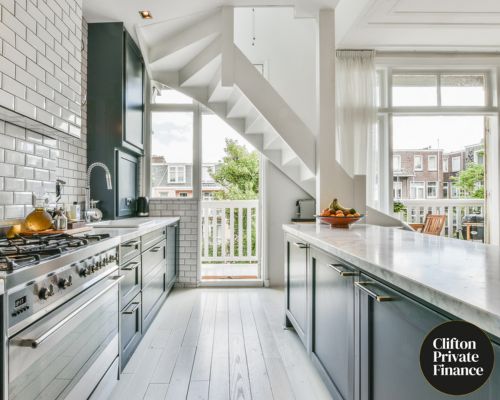Categories
Property Market Update: Major Lenders Pull Deals Amid Uncertainty

In our property market update, we explain how factors like the Autumn Budget and the US election have shaped consumer behaviour and what we can expect from the next 6 months.
The UK housing market is facing uncertainty as mortgage rates rise despite recent cuts to the Bank of England’s base rate. NatWest is the latest lender to increase its fixed-rate mortgage offerings, following moves by five other major banks this week. Rates have climbed by up to 0.35%, with sub-4% deals now a rarity.
The Bank of England raised the raise base rate 14 consecutive times between 2021 - 2024, and we've finally reached the much-anticipated destination of not one, but two base rank reductions. So why are mortgage rates now rising, just a few weeks after the base rate dropped below 5%?
Some analysts have attributed this to fallout from the Autumn Budget, which seems to be accumulating more controversy by the day, but it's worth looking at the larger economic landscape before deciding the Budget is totally to blame.
Firstly, it is common for mortgage providers to up rates when there is any level of uncertainty in the market. While the base rate does not directly determine mortgage rates, it does impact them. The Bank of England base rate sets the cost of borrowing, which means that banks will typically offer more affordable deals when the base rate is lower.
This is why it's common to see lenders change rates before the base rate announcement or other events that can impact the economy. Banks will often change rates based on affordability and market sentiment, so when it looks like the base rate will drop, lenders often pre-empt the decision and lower rates.
However, market uncertainty can muddy the waters. When it's difficult to know what's coming next, mortgage deals will typically chop and change or hover at a slightly elevated rate, which is what we are currently seeing.
While there are valid concerns surrounding elevated tax and business costs during an already difficult financial period, many economists predicted that mortgage rates wouldn't fall immediately after the budget, and this doesn't mean they won't drop again.
Additionally, while market sentiments and higher tax are impacting house price growth, we have seen an overall increase in 2024.
In this article, we take a look at the key changes in the UK property market over the past year and our forecast for 2025.
See data: Mortgage Pulse Report 2024

The mortgage market has been turned on its head in the past few months, and a number of changes have accumulated, leaving analysts and consumers alike wondering what's to come in the next few months.
Here are some factors that have affected the economy in 2024:
- For the past two years, the Bank of England has focused its efforts on reducing inflation, only for it to fall unexpectedly below 2% after the first base rate reduction in August.
- After 15 years of a Conservative government, this year's election brought in Labour.
- The Chancellor's first Autumn Budget since the election revealed a number of changes in legislation that will affect consumers.
- The US has captured the world's attention with the results of its recent election. Again, this change in administration will have a knock-on effect on UK buyers and international trade relations.
While some homebuyers are looking to make a purchase before stamp duty goes up in April, a third of the properties on the market are 'chain-free', indicating that a number of investors and landlords are selling up. This market activity could lead to a rise in inflation, but this should only have a negative impact if inflation rises significantly and uncontrollably.
The Bank of England reduced the base rate in order to stimulate market activity and bring inflation back up after it dropped below its 2% target. If they are able to keep inflation under control, it could mean that the UK economy is growing healthily.
While mortgage deals are in a state of flux, recent data by Savills predicts that market activity is slowly reaching pre-COVID levels, and house prices are still rising incrementally. Furthermore, Savills confirms that while external factors have affected the market, the knock-on impact on mortgage interest rates is likely to be short-lived.
See similar: Guide to the Most Expensive Streets in the UK
What Does This Mean for Buy to Lets?
Tighter letting legislation and high interest rates have eroded rental yields in the past five years. As well as this, legislation like the Renters Reform Bill, which will make it more difficult for landlords to end problematic tenancies and changes to Capital Gains Tax, Stamp Duty and Inheritance Tax are making it increasingly challenging to own and expand a rental portfolio.
Bigger portfolio landlords with large amounts of capital may be able to weather the storm, but many of those who are more vulnerable are looking at selling up to avoid excessive expenses.
That being said, there are still options that can make the process more affordable for investors. Converting your property to an HMO can increase your monthly rental income, and getting a BTL mortgage under a Limited Company instead of as an individual means that you'll pay corporation tax on your rental income instead of personal income tax.
With BTL investors leaving the market, this could free up housing stock for first time buyers, particularly those who have been waiting for interest rates to drop. However, with less rental properties on the market, this could make the rental market more competitive, which may lead to rent increases for tenants.
Read blog: The 9 Best Places to Live in the UK & Moving to the South West from London
See the latest market news below.
Where Are the Most Affordable Places in the UK to Buy a Home?
House prices are rising, but not as rapidly as they were before 2022.
In 2024, we did see a modest rise in house prices, but since the budget, this has come down slightly. The Bank of England base rate has dropped, but mortgage deals don’t seem to be moving in response to the Autumn Budget, which has since been widely considered inflationary.
As the housing market begins to recover from the past four years of economic turbulence, there seems to be a case of push and pull between house prices and interest rates restricting affordability.
Limited affordability has caused a visible divide between the UK’s most and least affordable housing. And unfortunately, in more expensive areas, first time buyers aren’t getting to enjoy much of a drop in house prices because the difference is made up by high interest rates and less favourable mortgage deals.
Mortgage rates have come down slightly from their 15-year high, and while the housing market does seem to be on the mend, it’s still not the easiest time to buy property for first-time buyers and investors alike.
For buy to let investors, regulations have gotten stricter since 2022, and high mortgage rates have thinned profit margins, making owning a standard buy to let a trickier affair than a decade ago.
While house prices have dropped slightly due to lack of affordability across London and the rest of the South, this isn't the case in other regions.
But this isn't the case everywhere in the UK. The North of England has seen entirely different purchasing behaviour to the South since the early 2000s. In select areas, particularly Yorkshire, North Lincolnshire and Durham, you can still easily buy a property for under £100,000.
Due to affordable housing and cheaper living costs in these areas, most of Northern England and Scotland have been resistant to the housing slump that the rest of the UK has experienced in response to high mortgage rates. The property market in these regions has remained robust and has seen growth throughout 2024.
There's certainly hope, both for property investors and those looking to get on the housing ladder. If you're looking to invest in a buy to let in 2024, it may be worth looking in affordable areas with a consistent rental demand, such as university towns or areas close to large employers. Property hotspots like these are still reaping generous rental yields while the rest of the country is seeing slow growth.
For first-time buyers, house prices coming down significantly could make it much easier for them to get on the housing ladder, but in many cases, house prices going up is beneficial for those using equity in their homes to make another purchase.
Here are some deals we've arranged for our clients recently




How Can You Find an Affordable Mortgage in 2024?
Despite current optimism about declining mortgage rates, deciding on the best option can be daunting.
We can help you compare mortgage products and their costs to find the best deal for your specific situation from a wide range of lenders nationwide.
Expert mortgage advisors keep their fingers on the pulse of the latest mortgage market news. Whether you're a first-time buyer, looking to refinance, or investing in a BTL, we can help you understand your mortgage options so you feel confident you're making the right choice.
To see what we can do for you, give us a call at 0203 900 4322 or book a free consultation below.






